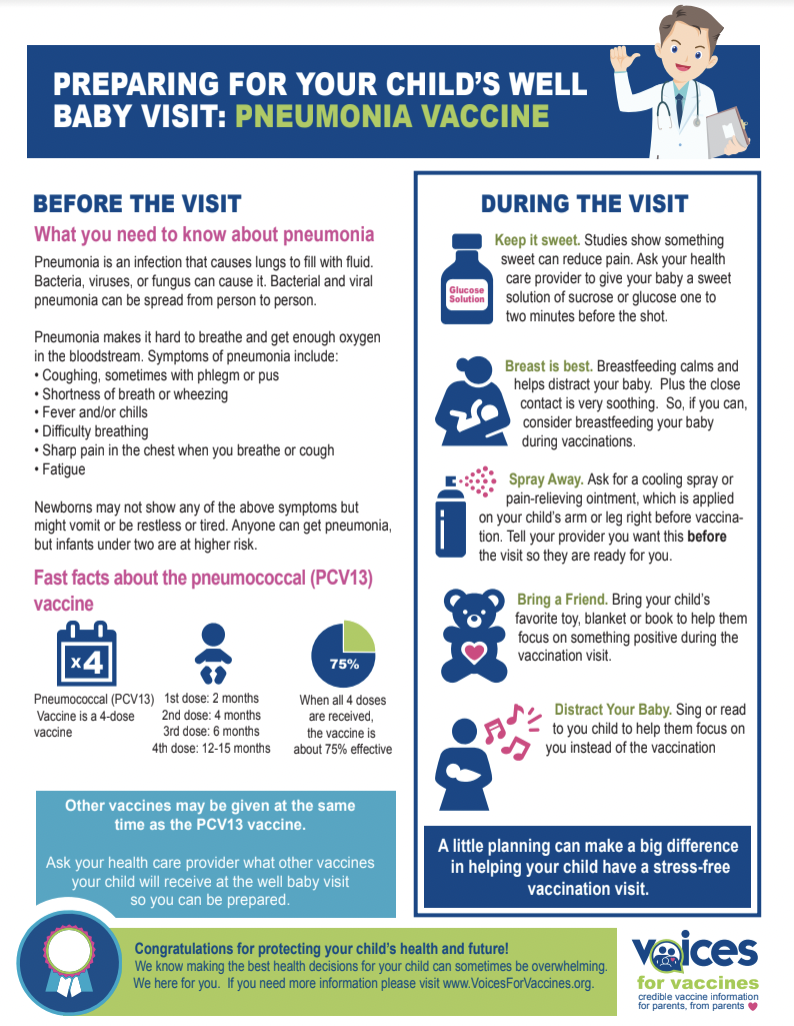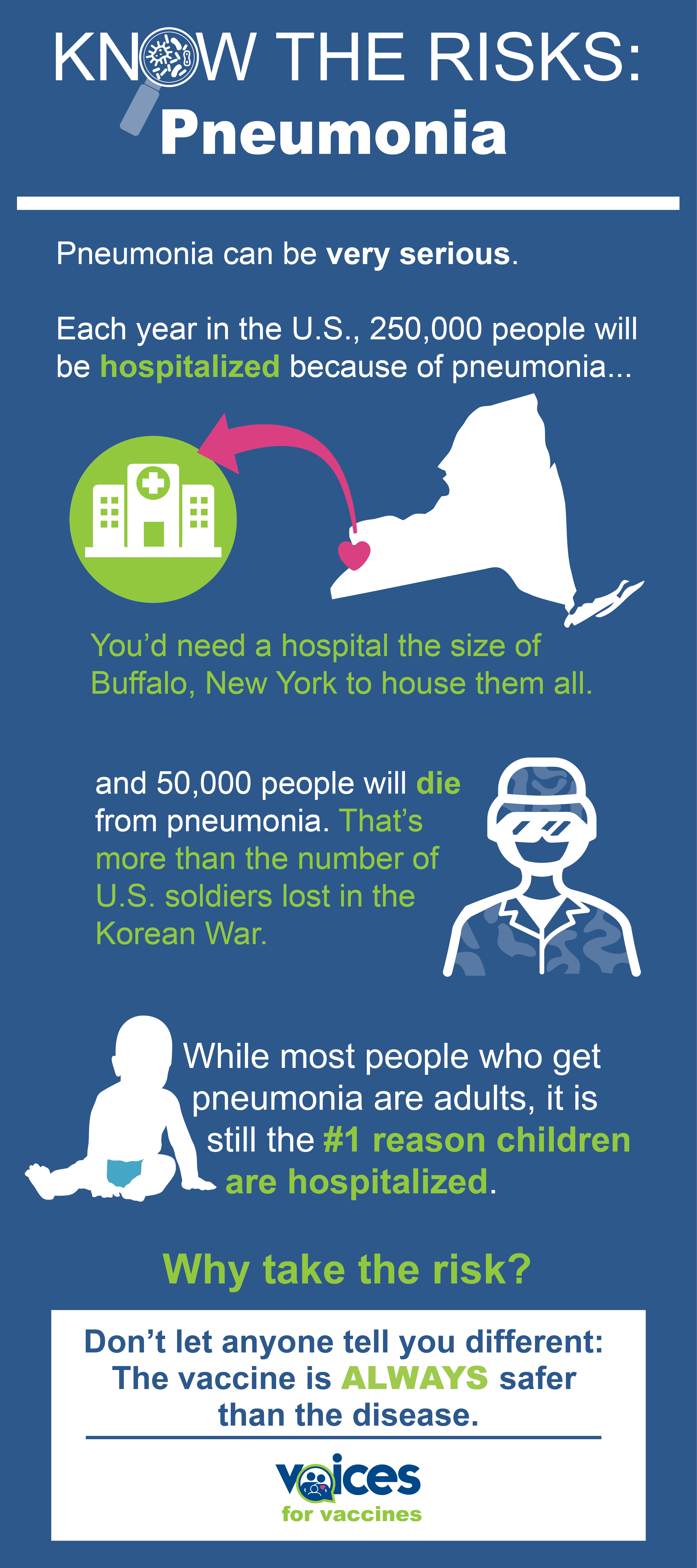Pneumococcal Vaccine
What is pneumococcal disease?
Pneumococcal disease is caused by bacteria called Streptococcus pneumoniae, also called pneumococcus. Although this vaccine is often called the pneumonia vaccine, this name isn’t quite accurate because pneumonia has multiple viral, bacterial, and fungal causes and because the vaccine protects against several strains of S. pneumoniae that cause multiple illnesses, some of which can be life threatening, including:
Pneumonia (an infection of the lungs)
- Fever and chills
- Cough
- Rapid breathing or difficulty breathing
- Chest pain
- Older adults with pneumococcal pneumonia may experience confusion or low alertness, rather than the more common symptoms listed above.
Meningitis (an infection of the lining of the brain and spinal cord)
- Stiff neck
- Fever
- Headache
- Photophobia (eyes being more sensitive to light)
- Confusion
- In babies, meningitis may cause poor eating and drinking, low alertness, and vomiting.
Bacteremia and Septicemia (bloodstream infections)
- Fever
- Chills
- Low alertness
- Confusion or disorientation
- Shortness of breath
- High heart rate
- Fever, shivering, or feeling very cold
- Extreme pain or discomfort
- Clammy or sweaty skin
Otitis Media (middle ear infection)
- Pneumococcus is thought to cause 50-60% of Otitis Media cases
Sinusitis (sinus infection)
What are the risks of pneumococcal disease?
Pneumococcal pneumonia
- Infection of the space between membranes that surround the lungs and chest cavity (empyema)
- Inflammation of the sac surrounding the heart (pericarditis)
- Blockage of the airway that allows air into the lungs (endobronchial obstruction), with collapse within the lungs (atelectasis) and collection of pus (abscess) in the lungs
- Pneumococcal pneumonia kills about 1 in 20 who get it.
Pneumococcal meningitis
- Pneumococcal meningitis kills about 1 in 12 children and 1 in 7 older adults who get it. Those who survive may have long-term problems, such as hearing loss or developmental delay.
Pneumococcal bacteremia
- Pneumococcal bacteremia kills about 1 out of 30 children and 1 out of 7 adults who get it. For those who survive, pneumococcal bacteremia can lead to loss of limb(s).
Sepsis
- Complications of sepsis include kidney failure and damage to the brain, lungs, or heart, and death.
Ear infections
- Pneumococcal ear infections are usually mild and are more common than the more severe forms of pneumococcal disease. However, some children develop repeated ear infections and may need ear tubes. Others can lose their hearing entirely.
Sinus Infections
- Complications are rare, but include infection of the tissue surrounding the eyes, bone infection, and a painful collection of pus (abscess).
How effective are the pneumococcal vaccines?
Before this vaccine was available, each pneumococcal infection caused:
- about five million ear infections
- more than 700 cases of meningitis
- 13,000 blood infections (septicemia); and
- other health problems including pneumonia, deafness, and brain damage
Because pneumococcal disease has so many possible manifestations, vaccination can protect against a number of conditions caused by pneumococcus, including invasive disease, ear infections, septicemia, pneumonia, meningitis, and others.
- Pneumococcal conjugate vaccine (PCV13). PCV13 vaccine is about 75.0% effective against invasive pneumococcal disease (IPD) which can cause meningitis
- Pneumococcal polysaccharide vaccine (PPSV23). PPSV23 vaccine is for people 65+ years of age or people with chronic illnesses. It is 60%–80% effective against invasive pneumococcal disease when given to healthy people but less effective in immunocompromised people.
How safe is the pneumonia vaccine?
- Pneumococcal conjugate vaccine (PCV13): The PCV13 vaccine is very safe: common side effects are mild and usually only last 1 – 2 days. They include drowsiness, loss of appetite, soreness or swelling where the vaccine was given, fever, and headache.
- Pneumococcal polysaccharide vaccine (PPSV23): The PPSV23 vaccine is extremely safe, and serious side effects are very rare. About half of the people who get PPSV23 have mild side effects (redness or pain where the vaccine is given). Less than 1% develop a fever, muscle aches, or more severe local reactions.
When should my family get the pneumonia vaccine?
- Pneumococcal conjugate vaccine (PCV13): for children under 2 and those with certain medical conditions.
- Pneumococcal polysaccharide vaccine (PPSV23): All adults 65+ years of age, people under 65 years of age with certain medical conditions, or who smoke.
Talk to your healthcare provider about what vaccines your family needs.
What can I expect at a pneumonia vaccine appointment?
A little research before your visit can go a long way to reducing your stress and concerns. Credible information helps ensure healthy choices and builds vaccine confidence.
Pneumonia Fact Sheet
Does someone in your family need a pneumonia vaccine? Download our pneumococcal vaccine fact sheet to prepare for your appointment.
Where can I get more information?
These organization are vaccine experts and can provide credible information:
How do I know this information is credible?
We work for parents so we make sure that parent concerns are addressed using facts and science and our content is reviewed by experts who have spent their careers studying vaccines. Learn more about how we ensure we are bringing you the best information to help you make healthy choices for your family.





